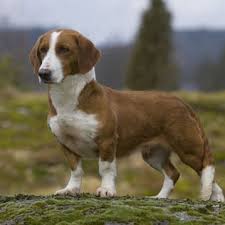
Westphalian Dachsbracke
Conditions of detention
Westphalian Dachsbrackes are adaptable and can thrive in various living environments, including urban apartments and rural homes. However, they do best in homes with access to outdoor spaces where they can exercise and explore.
Useful Fact:
These dogs require regular physical activity and mental stimulation to remain healthy and happy. They excel in homes with active owners who can provide them with opportunities to engage their hunting instincts.
Nutrition and diet
A balanced diet rich in high-quality proteins and essential nutrients is crucial for the Westphalian Dachsbracke to support its active lifestyle. High-quality commercial dog food or a diet incorporating lean meats, vegetables, and grains is recommended.
Useful Fact:
Feeding a diet that supports their energy levels and muscle mass helps maintain their health and vitality, especially given their active nature and demanding tasks.
Health
Westphalian Dachsbrackes are generally healthy dogs but can be prone to certain genetic conditions such as hip dysplasia, back problems, and ear infections. Regular veterinary check-ups are essential to monitor their health.
Useful Fact:
Keeping their ears clean and dry can help prevent ear infections, which are common in dogs with floppy ears.
Grooming and care
The Westphalian Dachsbracke has a short, dense coat that requires minimal grooming. Regular brushing helps remove loose hair and keep their coat healthy.
Useful Fact:
Their coat naturally sheds dirt and debris, making them relatively low-maintenance when it comes to grooming.
Education and training
Westphalian Dachsbrackes are intelligent and eager to please, making them relatively easy to train. They respond well to positive reinforcement and consistency.
Useful Fact:
Early socialization and obedience training are crucial to ensure they develop into well-mannered dogs that are comfortable around people and other animals.
Toys and entertainment
These dogs enjoy toys that challenge their minds and bodies, such as puzzle toys, fetch toys, and interactive games. Engaging in activities like scent work and agility training can be very stimulating for them.
Useful Fact:
Providing a variety of toys and regular playtime helps keep them mentally and physically active, preventing boredom and destructive behavior.
Safety
Due to their strong prey drive and high energy levels, Westphalian Dachsbrackes should be kept in a secure area when outdoors. They need to be monitored to prevent them from wandering off or chasing wildlife.
Useful Fact:
A well-fenced yard is essential to give them the freedom to roam safely without the risk of escaping.
Accessories
Sturdy collars, harnesses, and leashes are important for managing the Westphalian Dachsbracke during training and outdoor activities.
Useful Fact:
Using a harness can provide better control and prevent neck strain, especially during walks and training sessions.
Socialization
Westphalian Dachsbrackes are friendly and form strong bonds with their families but can be reserved with strangers. Early and consistent socialization is important to ensure they are comfortable in various environments.
Useful Fact:
Introducing them to different people, animals, and settings from a young age helps them become well-adjusted and confident adults.
Travel and Transportation
Westphalian Dachsbrackes can travel well if they are accustomed to it from a young age. Ensuring they have a comfortable and secure space in the vehicle is important.
Useful Fact:
Using a travel crate or a harness designed for car travel ensures their safety and comfort during trips.
Behavior and psychology
The Westphalian Dachsbracke is known for its loyalty, intelligence, and strong hunting instincts. They form strong bonds with their families and are naturally protective.
Useful Fact:
Understanding their hunting nature and providing proper training can help manage their behavior and ensure they are confident and well-behaved.
Legal aspects
Owners should comply with general dog ownership laws, such as licensing, vaccination requirements, and leash laws.
Useful Fact:
In some areas, there may be specific regulations regarding hunting breeds, so checking local laws is important.


